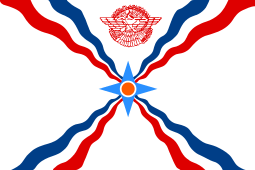Assyrians in the Netherlands
| Total population | |
|---|---|
| 60,000 | |
| Regions with significant populations | |
|
| |
| Languages | |
| Aramaic, Dutch | |
| Religion | |
| Syriac Orthodox |

The Assyrians of the Netherlands comprises migrants of Assyrian ancestry and their descendants born in the Netherlands. They mainly live in the east of the country, in the province of Overijssel, in such cities as Enschede, Hengelo, Almelo and Borne. The main reason that the Assyrians are concentrated there is because it is an industrial area which lies at the border with Germany, where a large German Assyrian population resides (many Assyrians in the Netherlands have relatives in Germany.)
History

The first Assyrians came to the Netherlands in the 1970s; most of them were from Turkey. In the 1980s, Assyrians from Syria began to emigrate to the Netherlands. The latest group of Assyrians immigrants come from Iraq, and have been arriving since the first Gulf War.
In the 1980s, as with other immigrants in Europe, a strong feeling of nationalism started to develop among the Assyrians in the Netherlands. This sentiment started to make Assyrians be active in working for projects that helped them preserve their identity. A few projects that started out were Assyrians society building, Assyrians churches and Assyrians language classes, which were being given in Dutch schools to Assyrian children and also on weekends in so-called Bible school classes. They also started camps for Assyrians youth, Assyrian music and dance classes were offered in the community, lectures to adult Assyrians on society building and lots of social events were organized for the Assyrian community. Since 1981 there is a Syriac Orthodox monastery in the village Glane near the German border.
The Assyrians began to organize demonstrations to bring their situation in the Assyrian homeland to the attention of the media and to bring the 20th century Assyrian genocide to the attention of the Dutch government.
Current situation
The Assyrians have managed to both integrate into Dutch society and maintain their own ethnic identity, as there are a lot of social events organized by Assyrian clubs. Some of the latest projects which Assyrians in the Netherlands have started are: the Seyfo Center, the Assyrian Church Choir, representation of Assyrians in the Dutch government (such as Attiya Gamri), and the foundation of the Assyrian Youth Movement (AJF).
Assyrians in the Netherlands mostly belong to Syriac Orthodox Church, but there is also a small community belonging to the Chaldean Catholic Church and Assyrian Church of the East. The first Assyrians mainly worked in factories or opened restaurants, but today, mostly attend university and work in all sectors of the economy.
Notable people
See also
- Turks in the Netherlands
- Iranians in the Netherlands
- Syrians in the Netherlands
- Iraqis in the Netherlands

